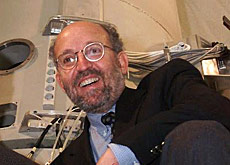
Geneva honours Swiss stargazer

Swiss astrophysicist, Michel Mayor, has been awarded the Geneva Foundation’s 2005 prize for his contribution to science.
Mayor, who identified the first planet outside our solar system in 1995, told swissinfo about the 21st century quest for other habitable planets in the universe.
Each year, the Geneva Foundation honours a personality or institution that has helped raise Geneva’s profile in the area of culture, science, economics or humanitarian work.
This year, they are highlighting Mayor’s celestial search for so-called “extrasolar” planets, which revolve around Sun-like stars.
Mayor made his discovery, which marked a scientific milestone a decade ago, with the help of a team of astronomers at Geneva University.
swissinfo: Since 1995, how many planets have been detected orbiting stars outside of our solar system?
Michel Mayor: The current count is 150, but that’s still very few. Exoplanetary systems are extremely rich and diverse when it comes to the chemical composition of their stars, the mass of the planets and the form of their orbits. Taking all that into account, we’re far from answering all of the questions that scientists have come up with about these mysterious worlds.
swissinfo: What direction has your research taken over the past decade?
M.M.: One of the hottest topics at the moment is the quest for planets that have a very small mass. Soon, we’ll have instruments that can detect them and that should enable us to discover a whole new family of celestial bodies, including planets similar to Earth or Mars. This is a very new field of research and holds great promise for the future.
The extrasolar planets that have already been identified are known to orbit very close to their stars… so their temperatures are very hot. But someday, we should be able to detect planets that are more distant from their “suns”, which would make them colder and therefore able to sustain life.
swissinfo: What is the timetable for this quest?
M.M.: Using today’s methods, which involve radial speed measurements, it would take a very long time to discover an exoplanet similar to Earth. But several space missions, including France’s Corot astronomy mission and Nasa’s Kepler quest for habitable planets, are expected to be launched in the coming years. These types of operations should make it possible to indirectly observe and detect very small planets.
We won’t actually be able to see these bodies, but we’ll be able to measure the drop in a star’s luminosity as its planet passes between it and the telescope. After that, the main task will be to analyse the chemical composition of the atmosphere of these very small planets.
But we’ll have to wait a lot longer before we’re able to directly observe such planets.
That type of research is expected to take place within the framework of Europe’s Darwin Mission and the American Terrestrial Planet Finding (TPF) programme. Over the next ten years, there are also plans to construct very large and powerful telescopes of around 50 to 100 metres in diameter here on Earth. These machines will have the capacity to directly detect small planets and analyse their chemical make-up.
swissinfo: Won’t this type of research deflect attention and funding away from the study of our own solar system?
M.M.: I believe that all these programmes can be carried out side-by-side. The final objective is the same: to search for other forms of life in the universe. This quest can take place in different ways. For example, by exploring Mars and traces of past life forms hidden beneath its surface.
The search for life outside our solar system will be more difficult and take longer. The fundamental question of whether extraterrestrial life forms exist will not be answered for at least another 15 years.
swissinfo: Are you able to find sufficient funding here in Switzerland to finance your work?
M.M.: We receive a great deal of support from the Swiss National Science Foundation and Geneva University, both in terms of staffing and money to build new research tools.
For example, the spectrograph that was put into service in Chile a year and a half ago was financed by the National Science Foundation. It is by far the best tool available to detect exoplanets.
swissinfo: How does Swiss astronomical research rank on an international scale?
M.M.: Our team discovered about half of the exoplanets identified so far. But other research centres in Switzerland are also doing remarkable work in this field, including a team at Bern University. They’re looking specifically at the formation of planets and their research has been widely recognised on an international level.
swissinfo: What impact has your research had on the field of astronomy?
M.M.: The discovery of the exoplanets, their characteristics and their diversity has led to a greater understanding of our solar system and its formation. During the 20th century, we made enormous progress in terms of researching the physics of stars, including the energy of the sun, the life cycle of stars and the origins of chemical elements. Today, a huge field of research remains before us in terms of the exoplanets. It’s a largely unexplored domain that will one day help us tackle the question of whether there is other life out there in the universe.
swissinfo-interview: Frédéric Burnand and Anna Nelson in Geneva
The Geneva Foundation is a private organisation that works to develop links between Geneva’s international community and local residents.
Each year, it honours a person or organisation that has helped raise the city’s international profile.
Renowned Swiss astrophysicist, Michel Mayor, is the winner of the foundation’s 2005 award.

In compliance with the JTI standards
More: SWI swissinfo.ch certified by the Journalism Trust Initiative






























You can find an overview of ongoing debates with our journalists here . Please join us!
If you want to start a conversation about a topic raised in this article or want to report factual errors, email us at english@swissinfo.ch.